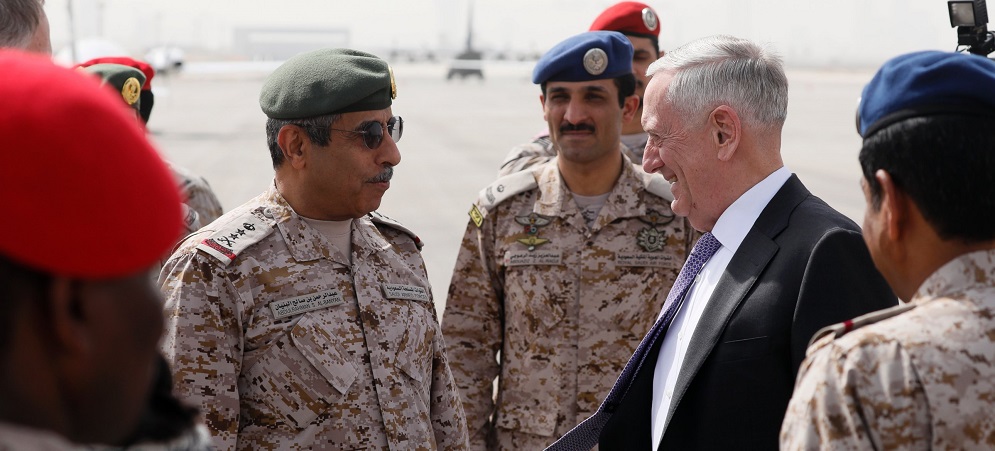
RNA - The visit is coming as the Trump administration has recently expanded intervention in the Yemeni conflict and also launched a missile attack against Syria’s Shayrat airbase, measures that aimed at expanding Washington regional activism and getting on board the regional allies which were dissatisfied with the former President Barack Obama administration’s policy.
Analysts believe choosing Riyadh as the first station of the defense secretary’s trip comes as Trump wants the kingdom to remain Washington’s closest ally in West Asia, a privilege that will help the new administration implement its overhauled strategy in the region.
To push for the aim, Mattis will then go to Egypt. He will work to fill the Cairo gaps with Washington that still remain standing as a legacy of Obama administration. Other steps will be taken including getting frayed Saudi Arabia-Egypt relations eased, all to move for dealing with the regional cases in association and coordination with the two regional allies.
At the current time, Riyadh and Washington are facing dead end in treating regional cases like those of Syria, Iraq, and Yemen. They heavily need getting in their side the Arab rulers for a smoother going of the way. Getting them on board is significant because Trump is projecting his racketeering policies that will require countries like Qatar and Saudi Arabia to pay a share in the renewed American military interventions and campaigns in the region.
Washington’s policy for persuading them to pay the costs of military actions is the traditional one: launching Iranophobic propaganda and warning the Arab regimes of the exaggerated Iranian danger for their rule. Such a propaganda campaign can help the Americans strike big arms deals with the Arab monarchies.
The US Department of Defense has stated that the visit comes as part of Washington’s efforts to counter the destabilizing measures and garner support for the US-led campaign to deter the terrorist groups in the region. “Destabilizing” is a term constantly used by the US to describe Iran's regional role. Iran has always been at the center of discussions of the US officials visiting the region’s Arab states. The visits majorly come for two leading aims: first, mobilizing the Arab countries' role in Syria and Iraq in a bid to check Iran’s increasing gain of influence and its support for Baghdad and Damascus. Second, marginalizing Iran in the Syrian conflict using alliance with the like-minded Arab states such as Saudi Arabia.
Riyadh, a regional rival of Tehran which severed diplomatic relations with the Islamic Republic, has welcomed Trump’s approaches towards Iran. The Saudi leaders are going to any length to extremely use the new administration’s anti-Iranian policy to challenge Tehran’s rising strength in West Asia.
Although the defense secretary seeks removing some roadblocks ahead of Washington’s regional policy including the Palestinian-Israeli conflict through negotiations with the allies, the core point of the trip is an effort to introduce the US West Asia policy under Donald Trump. The new president seeks a new strategy distinct from that of his predecessor President Obama in coping with the regional cases. The outstanding point of the new strategy is avoiding direct military involvement and making the allies shoulder the costs and act as proxies.
This fresh policy well defines Trump administration’s efforts after inauguration to send signals of normalization to the Arab rulers who earlier developed rifts with Washington over Obama’s regional policies. The analysts suggest that forces deployment to Yemen as well as April 7 missile attack against the Syrian airbase came as appeasing steps towards better Washington-Arab ties.
James Mattis regional visit at the time being is in fact a move to reaffirm Washington allies' role in its West Asian policy and to convince them to offer financial support guarantees for managing Syria and Iraq cases in post-ISIS time. The effort largely takes advantage of Iranophobic approaches as it rolls on.
During the visit, the Pentagon chief will underscore the counterterrorism operations in a bid to repair the damaged American image regionally and internationally, as at the same time he will try to build support for Trump among the public opinion at home. But the top goal remains the maximum realization of the American interests under covers like tackling the so-called Iranian risks and running the anti-ISIS campaign.
The outcomes of this American pathway, the analysts warn, is further destabilization and conflicts in West Asia region, the same outcome produced by multiple decades of Washington’s regional interventions which only led to large-scale arms sales on the one hand and massacring and displacement of the region’s nations on the other hand.
847/940
Source: Alwaght